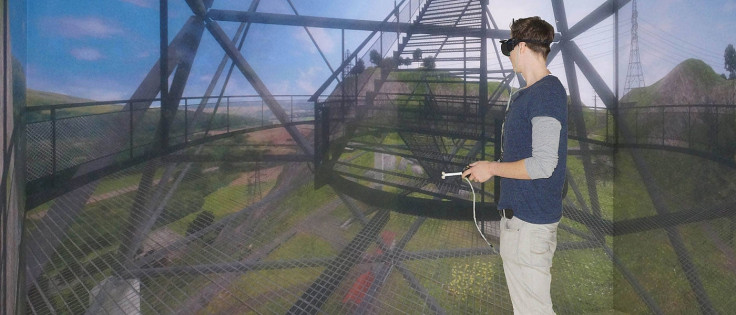Scientists discover possible cure for fear of heights using VR and magnetic brain stimulation
Using combination of therapies could help people 'unlearn' fears and phobias.
Scientists may have found a method to help cure people who suffer from a crippling fear of heights by using a combination of virtual reality and magnetic brain stimulation.
Researchers at the Wurzburg University Hospital in Germany have published a new study that demonstrates the combination of these two technologies could be effectively used as a therapy treatment for debilitating fears, anxieties and phobias.
The pioneering work claims that using transcranial magnetic stimulation (TMS) where magnetic pulses are directed at specific areas of the brain to either stimulate or inhibit activity, could help people "unlearn fears".
"We knew from previous studies that a specific region in the frontal lobe of the human brain is important for unlearning anxiety," explains Professor Martin Herrmann, University Hospital Würzburg, Centre for Mental Health.
The team found that combining TMS with virtual reality could improve a patient's response alongside traditional treatment such as Cognitive Behavioural Therapy to helping overcome fears ranging from air travel, using elevators or arachnophobia that would otherwise prevent them from performing their daily routine.
The study split a group of 39 participants who claim a fear of heights, with one half receiving stimulation to their frontal lobe for 20 minutes and the others being administered pseudo stimulation. The group were then exposed to dizzying heights using VR in a simulation that placed participants standing on an elevated platform high above the ground.

For sceptics who question the use of virtual reality as opposed to real-life heights, the team claims it does not matter that the environment is not real: "The people feel actual fear also in a virtual reality – although they know that they are not really in a dangerous situation," said Herrmann.
After two sessions the researchers claim the group treated with TMS prior to the VR simulation exhibited reduced anxiety than those who weren't.
What they found from this exercise was that "all participants benefit considerably from the therapy in virtual reality and the positive effects of the intervention are still clearly visible even after three months".
The study, which was published in the journal Brain Stimulation, concludes that stimulating the frontal lobe accelerated the response of therapy and the team is now looking into whether the same treatment can do the same for arachnophobics.
Virtual reality is being explored by other academics in the hope to diagnose and treat people who suffer from vertigo. A team of psychologists from Cardiff University are building virtual reality simulations that will be used to identify visual triggers in patients, in the hope that it will shed light on the causes of the condition and new rehabilitation techniques.
© Copyright IBTimes 2025. All rights reserved.






















